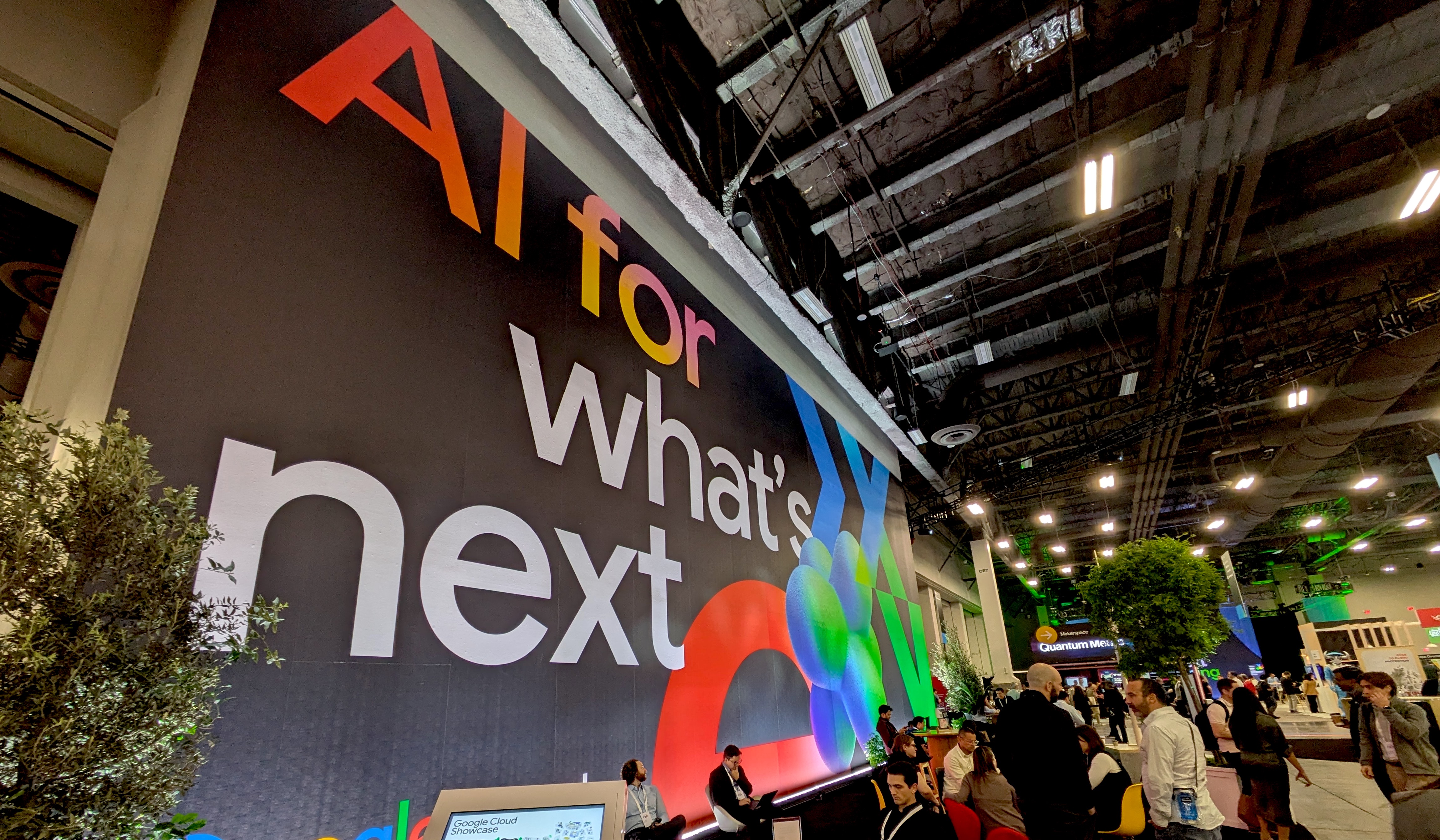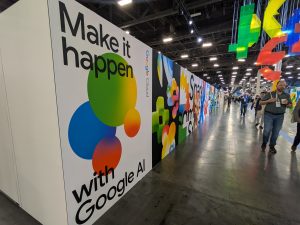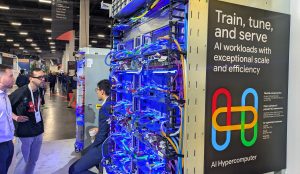 AI
AI
 AI
AI
 AI
AI
Google made a full-court press on artificial intelligence this week at its Cloud Next conference in Las Vegas, but the surprise is that it finally has a strategy and story that may give it a chance to lead the coming era of AI in the enterprise.
Just as AI appears poised to change everything in cloud, the enterprise and beyond, the No. 3 cloud provider debuted new AI processors, a raft of services to create agentic AI features, an agent-to-agent protocol, more AI in search, enterprise access to its own massive cloud infrastructure, and a lot more. Who remembers that Google was seen as hopelessly behind in AI a year or so ago?
Tariff insanity continues, with no sign of if or when it will end, at least before the 2026 midterms. Trump blinked on the broadest tariffs, sending stocks back up, but they went right back down Thursday, so who knows what’s next?
Those tariffs may have tanked tech stocks and our 401(k)s, but it’s not seeming to slow down AI funding — yet — as a16z may be raising a $20 billion fund focused on AI and Signalfire raises $1 billion for early-stage AI startups. And Mira Murati’s Thinking Machines reportedly is raising $2 billion all by itself — in a seed round. But how long will it last? As the Journal says, tariffs are still coming for the AI boom.
Elon Musk’s DOGE aims to hold a hackathon to rewrite IRS software. What could go wrong?
Here’s all the news from this week, and you can hear more about this and other news on John Furrier’s and Dave Vellante’s weekly podcast theCUBE Pod, out later today on YouTube:
Google Cloud Next was all about AI, of course — but given it is after all a cloud event, you can read all the news and analysis in Around the Enterprise below.
Breaking Analysis: Mapping Jensen’s world: Forecasting AI in cloud, enterprise and robotics
How Apple fumbled Siri’s AI makeover (per The Information): Internal chaos, poor leadership, John Giannandrea’s AI/ML group dubbed “AIMLess” internally. Ouch.
Mira Murati’s Thinking Machines reportedly raising $2B in funding
A16z in talks to raise $20B for AI investments — more capital than VCs have raised so far this year
SignalFire secures $1B to expand early-stage AI-focused investments
OpenAI could reportedly acquire Jony Ive’s AI device startup for $500M+
Rescale secures $115M Series D round to accelerate innovation with AI-driven digital engineering
Arena AI raises $30M to accelerate innovation in hardware testing with Atlas
Insurance technology startup Ominimo raises €10M in funding
PyannoteAI raises $9M for its speech processing AI
Mark Zuckerberg says Meta’s latest Llama models put open-source AI in the driving seat — though some think it fudged a bit.
Amazon debuts new Amazon Nova Sonic voice model
Deep Cogito releases open-source language models that outperform Llama
TransUnion caps massive data migration project with new analytics and security services
Riverbed rolls out new AI-powered observability features
Stytch and Cloudflare partner to secure Remote MCP servers with OAuth
Amazon Q Developer coding assistant now speaks multiple languages for coders worldwide
Atlassian upgrades its AI assistant Rovo and makes it available to all customers
Vectara launches open-source framework to evaluate enterprise RAG systems
Camunda adds AI agents to its process orchestration platform
Docker’s latest release provides a foundation for local AI model development
HubSpot unveils new AI agents and AI-powered workspace features for enterprise teams
ThoughtSpot adds reasoning to its conversational agent
TeKnowledge partners with Genesys to simplify the journey to AI-enabled CX
Some big-picture thoughts after three days of roaming the conference:
* This was nothing less than Google’s coming-out party for the beckoning world of AI applications, especially in the enterprise. It’s no secret that Google was caught flat-footed by the popularity of OpenAI’s ChatGPT immediately after it was released in late 2022, despite Google possessing fearsome AI chops. And before that, it was caught flat-footed by Amazon Web Services’ enormous success with cloud computing, despite Google having its own huge computing network. Now, AI has given Google another whack at capturing a large chunk of enterprise computing. “It feels like Google Cloud is the one-stop shop for AI now,” Google Cloud CTO Will Grannis said.
* CEO Thomas Kurian and Google in general seemed to have a crisper message about its position and ambitions than in previous years: It aims to become the go-to cloud for building and deploying AI-infused applications both in the cloud and in enterprise data centers.
 * In his keynote, Kurian called out several big advantages Google has in this new world of AI, and he wasn’t just blowing smoke. Google Cloud offers a computing platform optimized for AI, it works in multiple clouds and soon in corporate data centers, and platforms for building the AI apps enterprises are now clamoring to create. “Enterprise AI has put Google on the main stage,” new Google Cloud Chief Operating Officer Francis deSouza told me in an interview. TheCUBE Research’s John Furrier noted that “we’ve always liked the nerd side of Google, but now they got the blocking and tackling done. They’re not a dark horse anymore.” Indeed, it’s deSouza’s job to nail down the processes needed to cement that blocking and tackling in the enterprise.
* In his keynote, Kurian called out several big advantages Google has in this new world of AI, and he wasn’t just blowing smoke. Google Cloud offers a computing platform optimized for AI, it works in multiple clouds and soon in corporate data centers, and platforms for building the AI apps enterprises are now clamoring to create. “Enterprise AI has put Google on the main stage,” new Google Cloud Chief Operating Officer Francis deSouza told me in an interview. TheCUBE Research’s John Furrier noted that “we’ve always liked the nerd side of Google, but now they got the blocking and tackling done. They’re not a dark horse anymore.” Indeed, it’s deSouza’s job to nail down the processes needed to cement that blocking and tackling in the enterprise.
* In other interviews, several Google execs emphasized their belief that the company has the strongest position in AI compared with its two larger cloud competitors, AWS and Microsoft, by virtue of developing its own AI models. (AWS and Microsoft do have their own, and likely more coming, but Microsoft mainly leans heavily on OpenAI, and Amazon’s don’t appear to be widely used yet.) One marquee project to try to bring that home: Google’s work using AI to bring “The Wizard of Oz” to the immersive entertainment venue The Sphere in Las Vegas, where this week it showed some of its handiwork.
* You could almost feel Google’s renewed confidence, or perhaps an eagerness to exploit its renewed opportunity with the enterprise thanks to AI, which despite all criticism a year or two ago, it has deep expertise in — deeper than AWS or Microsoft and most of the AI startups out there. “We’ve hit that inflection point over the last couple months,” Raj Pai, VP of product for AI at Google Cloud — and former AWS and Microsoft exec — told me.
* It didn’t hurt that attendees seemed to feel it too — 30,000 of them, 50% more than last year — and the crowds at Mandalay Bay felt a little more like AWS’ much larger re:Invent than previous Next shows. I even caught cellphone-waving crowds following Kurian on his tour of the expo hall Thursday — not as frenzied as those who crowded Nvidia CEO Jensen Huang at his GTC event last month — but the excitement was hard to miss.
* Several new products stood out, including the new AI processor Ironwood, a seemingly big leap in performance and energy efficiency over the last tensor processing unit. It’s for internal use, so Nvidia has little to fear, but as the seventh generation of TPUs, it’s clear Google has some serious chip chops.
* Another big entry was a preview of Cloud WAN, essentially offering Google’s own global wide-area network for rent. It’s significant that Alphabet CEO Sundar Pichai introduced it at the top of the keynote Wednesday. “It’s one network for all enterprise needs,” Google Cloud networking chief Muninder Sambi told me.
* Likewise, Google’s Gemini AI models will now run on Google’s distributed cloud, enabling it to run inside enterprise data centers where some of the most important corporate data lives, including data that is too precious or regulated to move to the cloud yet. “Now, if you can’t come to the cloud, Google will bring AI to you,” said Amin Vahdat, Google Cloud’s VP of machine learning, systems and Cloud AI. “We have found a way… to bring these very differentiated models to customers where they need them,” added database chief Andi Gutmans in an interview. “AI is pulling customers into the cloud much faster.”
* Google also doubled down on AI agents, of course, in a number of dimensions, from an open-source Agent Development Kit to an Agent Engine for running them to an Agent Garden to find ready-to-use tools to an Agent Marketplace to an Agent2Agent protocol so they can all talk to each other — even those not made by Google. (Though AWS, Microsoft, OpenAI and others are conspicuously absent. Google execs said they’re working on that, but this will be a process as all prospective standards are.)
 * And though some of these new technologies are still in development and not fully available, it was no accident that Kurian spent much of his keynote highlighting and providing videos of customers such as Verizon, Toyota, Walmart and Reddit showing off that they’re already getting business benefit from Google AI products. He also noted that services partners have already created thousands of AI agents.
* And though some of these new technologies are still in development and not fully available, it was no accident that Kurian spent much of his keynote highlighting and providing videos of customers such as Verizon, Toyota, Walmart and Reddit showing off that they’re already getting business benefit from Google AI products. He also noted that services partners have already created thousands of AI agents.
* So what about those tariffs? Kurian drew laughs in a panel session Thursday when he said in his customary deadpan way: “The tariff discussion is an extremely dynamic one.” He added: “We have been through many cycles like this. We are very confident our executive team will find a path through it. We have to wait and see how this political environment and regulation evolves.”
* Of course, Microsoft and AWS will have their turn this year to make their cases, Microsoft at its Ignite conference in November (not to mention its Build conference next month) and AWS at re:Invent in December. The interesting thing, as theCUBE Research Dave Vellante said this week, is that unlike some technology markets where the No. 1 and No. 2 players utterly dominate, we now have a large and still-evolving market in cloud and AI where the No. 3 is not so far behind anymore.
That’s about all the time I have to sum up at this point, and check out all our coverage of Next:
Google’s cloud-based AI Hypercomputer gets new workhorse with Ironwood TPU
Agent2Agent: Google announces open protocol so AI agents can talk to each other
Google rolls out updates for building multi-agent AI ecosystems
With agentic AI, Google Cloud is transforming almost every aspect of app development
Google Cloud opens its global network for enterprise wide-area network use
Google boosts AI and agentic features across BigQuery and AlloyDB
Google uses AI wizardry to recreate ‘The Wizard of Oz’ in fully immersive 3D
Google brings the power of AI to healthcare with new partnerships
AI Mode in Google Search gets new visual search capabilities
New Workspace AI tools from Google focus on workflow automation and content creation
Google launches Unified Security platform and unveils Gemini agents for threat detection
Google upgrades Android Studio with enterprise-grade Gemini AI tools
Samsung integrates Google’s Gemini into its Ballie home robot
IBM revamps the venerable mainframe to run generative AI workloads and agents
Dell lays out broad set of enhancements aimed at data center modernization
Snowflake announces full support for Apache Iceberg
Snowflake to begin military service after obtaining Department of Defense IL5 authorization
Amazon’s Andy Jassy reiterates the need to spend billions on building out AI infrastructure
Networking startup Tailscale raises $160M at $1.5B valuation
Incident.io raises $62M to build AI agents for incident response
Silicon photonics startup nEye raises $58M to light up AI data centers
British GPU-as-a-service startup NexGen Cloud raises $45M
Observability startup Groundcover bags $35M in new funding to take on Datadog
Fern gets $9M in funding to automate the creation and maintenance of software development kits
Broadcom stock jumps on $10B buyback authorization
Samsung guides for softer Q1 profit but still beats consensus
Tariffs on China to increase to 104% as White House talks about building iPhones in the US
Tech stocks surge after Trump temporarily lowers tariffs to 10% for all countries except China
But not for long: Tech stocks give up some of Wednesday’s gains following tariff pause
Defense Department scraps $5.1B worth of technology and consulting contracts
Court rules UK Home Office’s legal battle with Apple over data must be conducted in public
Trump orders DOJ to investigate pair who disputed his allegation of election fraud Absolutely outrageous.
Xanthorox AI emerges as a new malicious threat in cybercrime communities
Darktrace uncovers spam bombing campaign used to mask targeted cyberattacks
First quarter of 2025 sets record for ransomware attacks and threat groups
SpyNote Android malware resurfaces in campaign using spoofed app install pages
SentinelLabs exposes AkiraBot spam tool powered by OpenAI-generated messages
Okta enhances Auth0 and core platform with expanded identity security features
Fortanix introduces Armet AI for compliant, secure enterprise generative AI deployment
CodeSecure and FOSSA partner to enhance visibility into open source and binary code
Tessell reels in $60M for its database-as-a-service platform
Hawk secures $56 million to expand financial crime detection platform
Aurascape launches with $50M in funding to bring security and observability to AI apps
Portnox raises $37.5M to scale cloud-native zero-trust access control
Corsha raises $18 million to expand machine identity security platform
Unosecur raises $5M in seed funding for AI-driven identity security
Elon Musk’s DOGE aims to hack the IRS and create a single API for easy access to U.S. taxpayer data
Ripple acquires Hidden Road in $1.25B deal to expand institutional crypto services
Google reportedly lays off hundreds of employees from consumer hardware group
Thinking Machines Lab, has gained two new prominent advisers: Bob McGrew, previously OpenAI’s chief research officer, and Alec Radford, a former OpenAI researcher behind many of the company’s more transformative innovations (per TechCrunch).
HPE appointed Stacy Dillow from Fluor its chief people officer
Observability firm Gigamon named Lisa Harrup Mieuli chief marketing officer.
April 16: AI Agent Builder Summit, a virtual event by theCUBE and theCUBE Research
THANK YOU